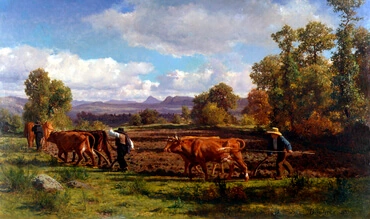1
Esta é a bênção com que Moisés, homem de Deus, abençoou os filhos de Israel antes da sua morte.
2
Disse ele: O Senhor veio do Sinai, e de Seir raiou sobre nós; resplandeceu desde o monte Parã, e veio das miríades de santos; à sua direita havia para eles o fogo da lei.
3
Na verdade ama o seu povo; todos os seus santos estão na sua mão; postos serão no meio, entre os teus pés, e cada um receberá das tuas palavras.
4
Moisés nos prescreveu uma lei, uma herança para a assembléia de Jacó.
5
E tornou-se rei em Jesurum, quando se congregaram os cabeças do povo juntamente com as tribos de Israel.
6
Viva Rúben, e não morra; e não sejam poucos os seus homens.
7
E isto é o que disse de Judá: Ouve, ó Senhor, a voz de Judá e introduze-o no meio do seu povo; com as suas mãos pelejou por si; sê tu o seu auxílio contra os seus inimigos.
8
De Levi disse: Sejam teu Tumim e teu Urim para o teu homem santo, que provaste em Massá, com quem contendeste junto às águas de Meribá;
9
aquele que disse de seu pai e de sua mãe: Nunca os vi, e não reconheceu a seus irmãos, e não conheceu a seus filhos; pois esses levitas guardaram a tua palavra e observaram o teu pacto.
10
Ensinarão os teus preceitos a Jacó, e a tua lei a Israel; chegarão incenso ao seu nariz, e porão holocausto sobre o teu altar.
11
Abençoa o seu poder, ó Senhor, e aceita a obra das suas mãos; fere os lombos dos que se levantam contra ele e o odeiam, para que nunca mais se levantem.
12
De Benjamim disse: O amado do Senhor habitará seguro junto a ele; e o Senhor o cercará o dia todo, e ele habitará entre os seus ombros.
13
De José disse: Abençoada pelo Senhor seja a sua terra, com os mais excelentes dons do céu, com o orvalho, e com as águas do abismo que jaz abaixo;
14
com os excelentes frutos do sol, e com os excelentes produtos dos meses;
15
com as coisas mais excelentes dos montes antigos, e com as coisas excelentes dos outeiros eternos;
16
com as coisas excelentes da terra, e com a sua plenitude, e com a benevolência daquele que habitava na sarça; venha tudo isso sobre a cabeça de José, sobre o alto da cabeça daquele que é príncipe entre seus irmãos.
17
Eis o seu novilho primogênito; ele tem majestade; e os seus chifres são chifres de boi selvagem; com eles rechaçará todos os povos, sim, todas as extremidades da terra. Tais são as miríades de Efraim, e tais são os milhares de Manassés.
18
De Zebulom disse: Zebulom, alegra-te nas tuas saídas; e tu, Issacar, nas tuas tendas.
19
Eles chamarão os povos ao monte; ali oferecerão sacrifícios de justiça, porque chuparão a abundância dos mares e os tesouros escondidos da areia.
20
De Gade disse: Bendito aquele que faz dilatar a Gade; habita como a leoa, e despedaça o braço, e o alto da cabeça.
21
Ele se proveu da primeira parte, porquanto ali estava reservada a porção do legislador; pelo que veio com os chefes do povo, executou a justiça do Senhor e os seus juízos para com Israel.
22
De Dã disse: Dã é cachorro de leão, que salta de Basã.
23
De Naftali disse: ç Naftali, saciado de favores, e farto da bênção do Senhor, possui o lago e o sul.
24
De Aser disse: Bendito seja Aser dentre os filhos de Israel; seja o favorecido de seus irmãos; e mergulhe em azeite o seu pé;
25
de ferro e de bronze sejam os teus ferrolhos; e como os teus dias, assim seja a tua força.
26
Não há outro, ó Jesurum, semelhante a Deus, que cavalga sobre o céu para a tua ajuda, e na sua majestade sobre as mais altas nuvens.
27
O Deus eterno é a tua habitação, e por baixo estão os braços eternos; ele lançou o inimigo de diante de ti e disse: Destrói-o.
28
Israel pois habitará seguro, a fonte de Jacó a sós, na terra de grão e de mosto; e o seu céu gotejará o orvalho.
29
Feliz és tu, ó Israel! quem é semelhante a ti? um povo salvo pelo Senhor, o escudo do teu socorro, e a espada da tua majestade; pelo que os teus inimigos te serão sujeitos, e tu pisarás sobre as suas alturas.







